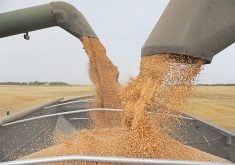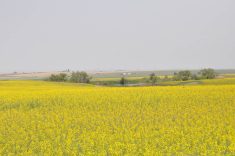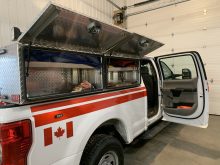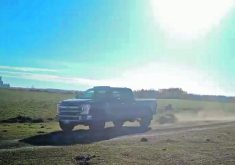Saskatchewan’s community safety officer program is an option for municipalities looking for bylaw enforcement and low-risk policing needs, but only about 30 officers have been hired since the program’s rollout five years ago.
Daryl Chernook, program manager for the province’s corrections and policing ministry, said CSOs can be another presence in rural areas to help deter crime.
They drive marked vehicles, wear specific uniforms, and can make arrests in some circumstances.
Read Also

Farming Smarter receives financial boost from Alberta government for potato research
Farming Smarter near Lethbridge got a boost to its research equipment, thanks to the Alberta government’s increase in funding for research associations.
“It is uniformed presence,” he told delegates to Saskatchewan Association of Rural Municipalities’ midterm convention in Regina.
“The level of training and negotiation in risk assessment and things like that is not to the level of a police officer. We don’t expect a CSO, when hired by a rural municipality for instance, to step into those policing type roles.”
Chernook said CSOs can enforce the Traffic Safety Act, littering laws and liquor and gaming violations, such as open liquor.
This frees up police to deal with more serious crimes.
Tim Brodt, councillor in the RM of Edenwold, said that municipality was one of the first to hire a CSO and is pleased with the result.
“We’ve got two officers currently that are doing weights and measures,” he told the convention. “We’re doing a lot of bylaw enforcement. We’re quite happy with the program and we’re looking towards the future and quite frankly you can’t put a price tag on the infrastructure that’s being protected by getting some of these heavier trucks off our roads.”
Cheryl Bauer Hyde, a reeve in the Lakeland district, said those who supervise CSOs need training or more information on how to supervise the officers.
“We’re subject to Part 4 of the police act and the complaint process,” she noted.
Chernook encouraged rural municipalities to work with towns in their areas to put together regional CSO services.
“You don’t have to regionalize your service,” he said, adding that four RMs and three towns could work together to hire a couple of officers. “Some places could also start (the service) on their own but also contract the services to other towns on a fee-for-service basis.”
A training course was scheduled to begin earlier this month but it wasn’t filled. Chernook said another course is planned for spring. Some First Nations are intending to send candidates and he hoped some RMs and towns would do the same.
“We’re hoping to grow by five to 10 over the next year, no guarantees of course,” he said.
One SARM delegate expressed concern about the cost of radio dispatch services for CSOs, which is about $2,000 per month. Chernook said that is the fee from the provider; SARM president Ray Orb said that could be offset at least in part by fine revenue.
Meanwhile, Alfredo Bangloy, chief superintendent in charge of criminal operations at the Saskatchewan RCMP, said the police force is happy with participation in the Saskatchewan Crime Watch Advisory Network. That is the notification system from RCMP detachments available through the Everbridge app and by email.
Rural Crime Prevention Panel happening now with @RCMPSK rep C/Supt Alfredo Bangloy and CSO Program Manager, Daryl Chernoff #ruralcrime #prevention pic.twitter.com/2kLCCR4qT9
— SARM (@SARM_Voice) November 14, 2019
“I think we have about 12,000 people registered,” he said. “It has shown a lot of results and success as far as assisting us in resolving various issues from suspicious persons to specific crimes.”
Asked about RCMP vacancies, Bangloy said about 90 cadets were enrolled in the first half of 2019.
“And we’re at the lowest vacancy rate that we’ve seen in years, almost full,” he said.
Surveillance cameras on private property are one way to tackle and help prevent rural crime, he said.
Orb noted that Alberta is implementing higher fines for trespassing after the high-profile case of animal activists entering a turkey barn.
“This is something we may have to look at in Saskatchewan,” he said.


















